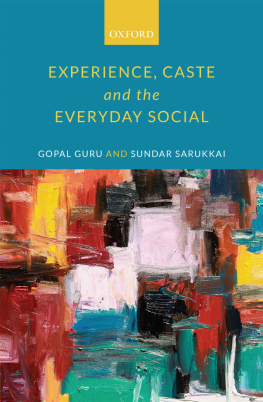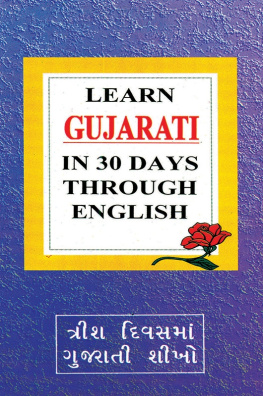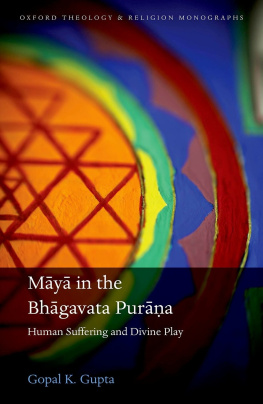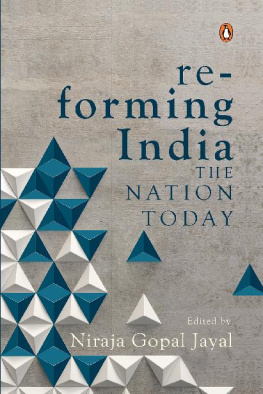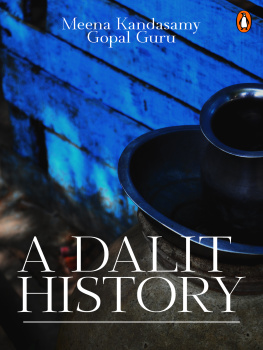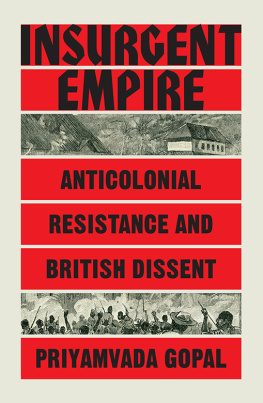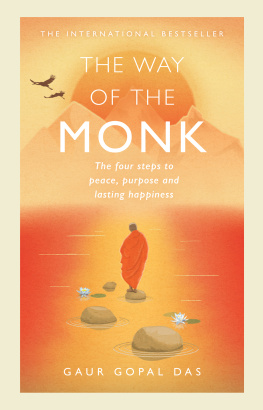Gopal Guru - Experience, Caste, and the Everyday Social
Here you can read online Gopal Guru - Experience, Caste, and the Everyday Social full text of the book (entire story) in english for free. Download pdf and epub, get meaning, cover and reviews about this ebook. year: 2019, publisher: OUP India, genre: Religion. Description of the work, (preface) as well as reviews are available. Best literature library LitArk.com created for fans of good reading and offers a wide selection of genres:
Romance novel
Science fiction
Adventure
Detective
Science
History
Home and family
Prose
Art
Politics
Computer
Non-fiction
Religion
Business
Children
Humor
Choose a favorite category and find really read worthwhile books. Enjoy immersion in the world of imagination, feel the emotions of the characters or learn something new for yourself, make an fascinating discovery.
- Book:Experience, Caste, and the Everyday Social
- Author:
- Publisher:OUP India
- Genre:
- Year:2019
- Rating:5 / 5
- Favourites:Add to favourites
- Your mark:
- 100
- 1
- 2
- 3
- 4
- 5
Experience, Caste, and the Everyday Social: summary, description and annotation
We offer to read an annotation, description, summary or preface (depends on what the author of the book "Experience, Caste, and the Everyday Social" wrote himself). If you haven't found the necessary information about the book — write in the comments, we will try to find it.
Experience, Caste, and the Everyday Social — read online for free the complete book (whole text) full work
Below is the text of the book, divided by pages. System saving the place of the last page read, allows you to conveniently read the book "Experience, Caste, and the Everyday Social" online for free, without having to search again every time where you left off. Put a bookmark, and you can go to the page where you finished reading at any time.
Font size:
Interval:
Bookmark:
Experience, Caste, and the Everyday Social
Experience, Caste, and the Everyday Social
Gopal Guru
Sundar Sarukkai


Oxford University Press is a department of the University of Oxford.
It furthers the Universitys objective of excellence in research, scholarship,
and education by publishing worldwide. Oxford is a registered trademark of
Oxford University Press in the UK and in certain other countries.
Published in India by
Oxford University Press
2/11 Ground Floor, Ansari Road, Daryaganj, New Delhi 110 002, India
Oxford University Press 2019
The moral rights of the authors have been asserted.
First Edition published in 2019
All rights reserved. No part of this publication may be reproduced, stored in
a retrieval system, or transmitted, in any form or by any means, without the
prior permission in writing of Oxford University Press, or as expressly permitted
by law, by licence, or under terms agreed with the appropriate reprographics
rights organization. Enquiries concerning reproduction outside the scope of the
above should be sent to the Rights Department, Oxford University Press, at the
address above.
You must not circulate this work in any other form
and you must impose this same condition on any acquirer.
ISBN-13 (print edition): 978-0-19-949605-1
ISBN-10 (print edition): 0-19-949605-6
ISBN-13 (eBook): 978-0-19-909789-0
ISBN-10 (eBook): 0-19-909789-5
Typeset in ITC Giovanni Std 9.5/13
by Tranistics Data Technologies, New Delhi 110 044
Printed in India by Replika Press Pvt. Ltd
Contents
The origin of this book can be traced back to our earlier volume We believed that social theory had to find a different voice to speak about the everydayness of the multitude of the socials surrounding us. And, like in the CM, we went back to the question of experiencethis time the experience of the social. We were well aware that this was a step that was intellectually discomforting if not dangerous given the reaction to the category of experience within the social sciences in general. But perhaps that was also the incentive to work through this difficult task of integrating different disciplinary approaches, including philosophy, sociology, political science, and literature, to the idea of the social. We also wanted to write in a way that was accessible but also intellectually rigorous and unlike the CM, we wrote this book jointly. We do not know if our readers will be as generous to this book as they were to the CM; however, we hope that they will at least be provoked to find new ways of thinking about the complex social experiences that are particularly special to the non-West.
As always, we are indebted to many people in various ways. To those who have contributed in one way or the other to our journey in this book: The faculty and students who engaged with us in Hyderabad Central University, Tata Institute of Social Sciences, Jawaharlal Nehru University, Manipal Centre for Philosophy and Humanities, National Institute of Advanced Studies, English and Foreign Languages University, and other institutions. We are also thankful for the support of these people who have been in conversation with us, wrote about, or organized discussions around the CM and themes in this book: Raghurama Raju, K. Satyanarayana, Probal Dasgupta, Rustom Bharucha, Rita Kothari, Srinivasan Ramanujam, Samir Banerjee, K.V. Akshara, S. Parasuraman, Arjun Appadurai, Sheldon Pollock, Sudipta Kaviraj, Mary John, Rajeshwari Sundar Rajan, Anupama Rao, Udaya Kumar, Arvind, Rajan Gurukkal, Sanil, Milind Wakankar, Satish Deshpande, Lakshmi Srinivas, Tulasi Srinivas, and Akeel Bilgrami. A special word of thanks to our colleagues and students who have engaged with us on these topics for long and with patience and friendship: Gurpreet Mahajan, Babu Thaliath, Meera Baindur, N.S. Gundur, George Verghese, Nikhil Govind, Kaveri Haritas, Apaar Kumar, Anindita Majumdar, Gayathri Prabhu, B.K. Anitha, Carol Upadhya, Shivali Tukdeo, Hamsa Kalyani, Saurabh, N.Y. Manoj, Asim Siddiqui, Madhava Chippali, Pooja Nayak, Kaushik Ramu, Aivin Aivinor, Jobin Mathew, Renny Thomas, Nitesh Choudhary, Leya Mathew, Varun Bhatta, Srajana Kaikini, Nitesh Anchan, Savita Suresh, M. Rashmi, Shireen Azam, and Subroto Dey. We are grateful for the generous friendship of Carolyn Rouse, John Bornemann, Parvis Ghassem-Fachandi, and Carol Greenhouse, and also for having us as a part of their engaged anthropology. A special thanks to Gordon McOuat and words of gratitude to Bruce Kapferer for critical and illuminating conversations on these topics.
As always, we are indebted to Hema and Dhanu for continuing to make the everyday special and also our thanks to Dhanu for editing the manuscript.
We are experientially pervaded by the social in many ways. There is no one universal social but a multitude of socials that characterize societal experiences. These multiple experiences of the social influence the ideas we form of the social, as well as give cognitive access to the different socials. In true empirical spirit, we begin with the fact of an experience which is recognized most commonly, and across members of a society, as being an experience of the social. This experience catalyses the way we see the social world and also influences how we act within this world. Within these set of experiences constituting the social, can we say something more meaningful about this term, how we use it, and how it matters to understanding societies? Can it offer us a new way of understanding the social processes of societies in Asia, Africa, and the Middle East, all of which exemplify complex experiences of the social? To emphasize this aspect of experience, we focus on the everyday social, the world of experiences of the social which is part of everyday life. While what we say may have implications for other forms of the social, such as social institutions, we restrict ourselves to the everyday experiences of the social that become part of the everyday talk of the world. The aim of this book is to explore the nature of the everyday social, based on the multiple ways of experiencing and articulating these experiences, with particular focus on the experiences of caste in the everyday social.
Sociologists and philosophers have long pointed out a simple fact that the idea of the social has always been ambiguously defined. shows how this concept was defined in quite contradictory ways by Weber, Durkheim, and others. The problem of correctly understanding the nature of the social is important for the social sciences since clarity on the object of discourse will help clarify fundamental questions about the nature of knowledge in the social sciences as well as the methodologies involved in their study.
For some, the problem of the social is really nothing more than the problem of wholes and their relation with their parts. The notion of the social is really a matter of understanding the nature of collections in general and the core question about collections is whether a collection is more than its parts. Equivalently, this is the question of whether the social is nothing more than the individuals who constitute it. Thus, to understand the social along this trajectory, it is only necessary to consider the individuals and there is nothing else that stands for the collective over and beyond its members. This view is also enshrined methodologically as methodological individualism and this also leads to well-known debates that often places the category of the social in opposition to that of the individual.
Next pageFont size:
Interval:
Bookmark:
Similar books «Experience, Caste, and the Everyday Social»
Look at similar books to Experience, Caste, and the Everyday Social. We have selected literature similar in name and meaning in the hope of providing readers with more options to find new, interesting, not yet read works.
Discussion, reviews of the book Experience, Caste, and the Everyday Social and just readers' own opinions. Leave your comments, write what you think about the work, its meaning or the main characters. Specify what exactly you liked and what you didn't like, and why you think so.

